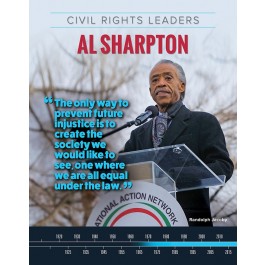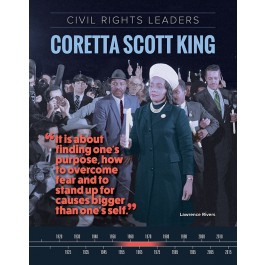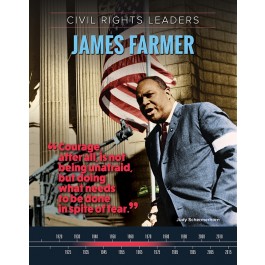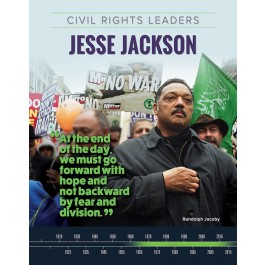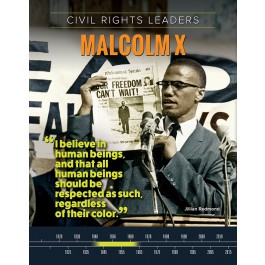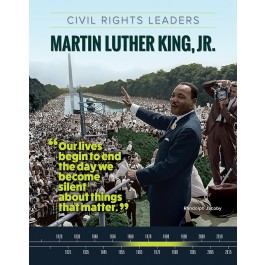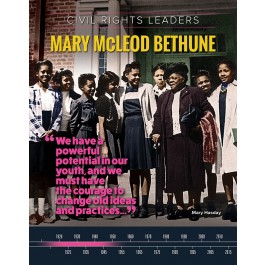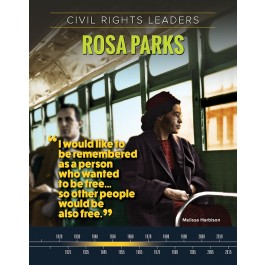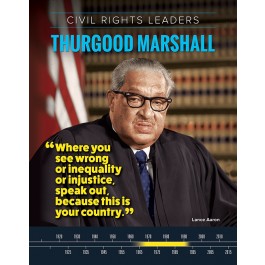CIVIL RIGHTS LEADERS
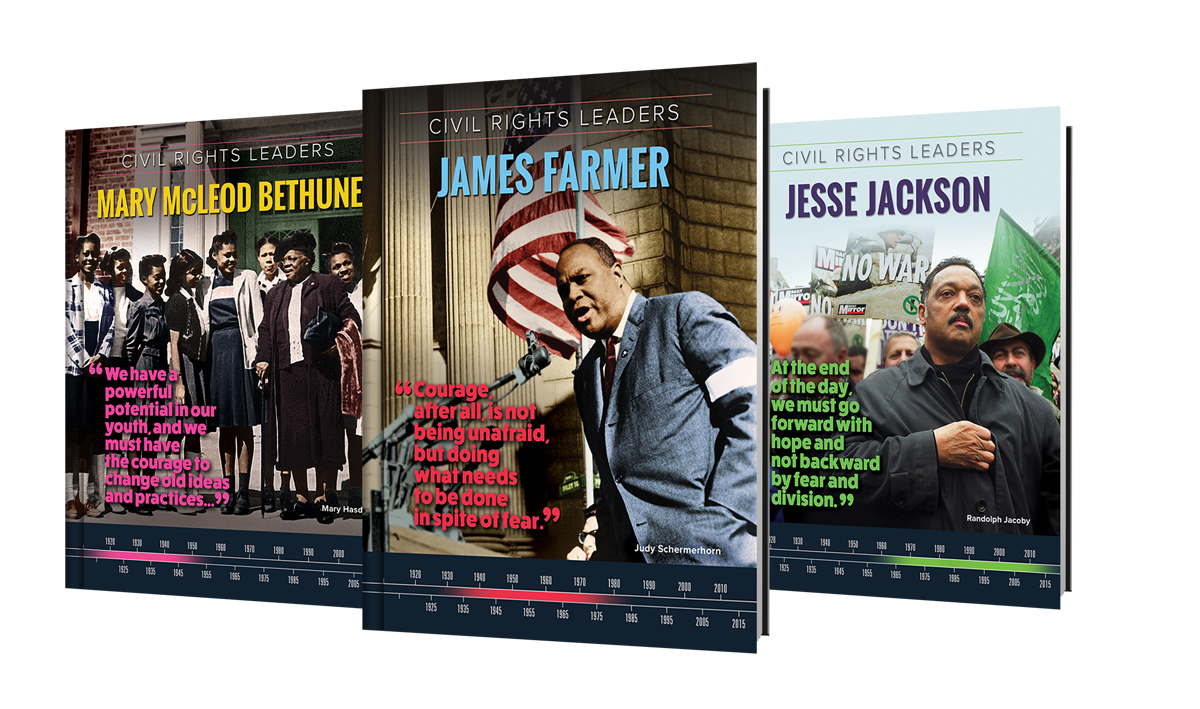
9
2019
12+
7th - 12th
7 x 9
by Randolph Jacoby
| Hardcover | ISBN 978-1-4222-4003-8 | $26.95 | Add To Cart |
The Reverend Al Sharpton is a flamboyant and controversial figure who for decades has led protest marches and demonstrations to draw attention to injustices committed against the African-American community. During the 1980s and 1990s Sharpton’s high-profile cases occurred mainly in the New York area, but today he is a nationally recognized figure. Sharpton has been the target of violence, including an assassination attempt. Yet he has persisted in his attempts to end social injustice. Each title in this series includes color photos throughout, and back matter including: an index and further reading lists for books and internet resources. Key Icons appear throughout the books in this series in an effort to encourage library readers to build knowledge, gain awareness, explore possibilities and expand their viewpoints through our content rich non-fiction books. Key Icons in this series are as follows: Words to Understand are shown at the front of each chapter with definitions. These
words are set in boldfaced type in that chapter, so that readers are able to reference back to the definitions--building their vocabulary and enhancing their reading comprehension. Sidebars are highlighted graphics with content rich material within that allows readers to build knowledge and broaden their perspectives by weaving together additional information to provide realistic and holistic perspectives. Educational Videos are offered in chapters through the use of a QR code, that, when scanned, takes the student to an online video showing a moment in sports' history, a speech, or an instructional video. This gives the readers additional content to supplement the text. Text-Dependent Questions are placed at the end of each chapter. They challenge the reader’s comprehension of the chapter they have just read, while sending the reader back to the text for more careful attention to the evidence presented there. Research Projects are provided at the end of each chapter as well and provide readers with suggestions for projects that encourage deeper research and analysis. And a Series Glossary of Key Terms is included in the back matter containing terminology used throughout the series. Words found here broaden the reader’s knowledge and understanding of terms used in this field.
by Lawrence Rivers
| Hardcover | ISBN 978-1-4222-4004-5 | $26.95 | Add To Cart |
On April 4, 1968, Martin Luther King Jr. was killed by an assassin’s bullet. To his widow Coretta, Martin’s death meant more than the loss of her beloved husband and the father of their four children. It also changed the world’s perception of her from supportive wife to prominent civil rights activist in her own right. After Martin Luther King Jr.’s death, Coretta perpetuated his message of peace and equality for all Americans, living a life dedicated to public service until her death in 2006. Each title in this series includes color photos throughout, and back matter including: an index and further reading lists for books and internet resources. Key Icons appear throughout the books in this series in an effort to encourage library readers to build knowledge, gain awareness, explore possibilities and expand their viewpoints through our content rich non-fiction books. Key Icons in this series are as follows: Words to Understand are shown at the front of each chapter with
definitions. These words are set in boldfaced type in that chapter, so that readers are able to reference back to the definitions--building their vocabulary and enhancing their reading comprehension. Sidebars are highlighted graphics with content rich material within that allows readers to build knowledge and broaden their perspectives by weaving together additional information to provide realistic and holistic perspectives. Educational Videos are offered in chapters through the use of a QR code, that, when scanned, takes the student to an online video showing a moment in sports' history, a speech, or an instructional video. This gives the readers additional content to supplement the text. Text-Dependent Questions are placed at the end of each chapter. They challenge the reader’s comprehension of the chapter they have just read, while sending the reader back to the text for more careful attention to the evidence presented there. Research Projects are provided at the end of each chapter as well and provide readers with suggestions for projects that encourage deeper research and analysis. And a Series Glossary of Key Terms is included in the back matter containing terminology used throughout the series. Words found here broaden the reader’s knowledge and understanding of terms used in this field.
by Judy Schermerhorn
| Hardcover | ISBN 978-1-4222-4005-2 | $26.95 | Add To Cart |
James Farmer was one of the most influential leaders in America’s fight against racial discrimination. A Methodist minister, Farmer formed the Congress of Racial Equality (CORE) in 1942 to orchestrate a campaign of nonviolent direct action for an integrated society. Holding defiant yet peaceful protests for the purpose of ending segregation in housing, restaurants, and other public facilities, the organization emerged as a major force in the civil rights movement. Each title in this series includes color photos throughout, and back matter including: an index and further reading lists for books and internet resources. Key Icons appear throughout the books in this series in an effort to encourage library readers to build knowledge, gain awareness, explore possibilities and expand their viewpoints through our content rich non-fiction books. Key Icons in this series are as follows: Words to Understand are shown at the front of each chapter with definitions. These words are set in
boldfaced type in that chapter, so that readers are able to reference back to the definitions--building their vocabulary and enhancing their reading comprehension. Sidebars are highlighted graphics with content rich material within that allows readers to build knowledge and broaden their perspectives by weaving together additional information to provide realistic and holistic perspectives. Educational Videos are offered in chapters through the use of a QR code, that, when scanned, takes the student to an online video showing a moment in sports' history, a speech, or an instructional video. This gives the readers additional content to supplement the text. Text-Dependent Questions are placed at the end of each chapter. They challenge the reader’s comprehension of the chapter they have just read, while sending the reader back to the text for more careful attention to the evidence presented there. Research Projects are provided at the end of each chapter as well and provide readers with suggestions for projects that encourage deeper research and analysis. And a Series Glossary of Key Terms is included in the back matter containing terminology used throughout the series. Words found here broaden the reader’s knowledge and understanding of terms used in this field.
by Randolph Jacoby
| Hardcover | ISBN 978-1-4222-4006-9 | $26.95 | Add To Cart |
The Reverend Jesse Jackson is one of the most articulate and recognizable figures of the civil rights movement. Working with Martin Luther King Jr.’s Southern Christian Leadership Conference (SCLC), his organizational skills and mesmerizing speaking style brought him national attention. Jackson waged groundbreaking campaigns for the Democratic Party’s presidential nomination in 1984 and 1988. In recent years Jackson has continued to draw attention to the major issues of the African-American community. Each title in this series includes color photos throughout, and back matter including: an index and further reading lists for books and internet resources. Key Icons appear throughout the books in this series in an effort to encourage library readers to build knowledge, gain awareness, explore possibilities and expand their viewpoints through our content rich non-fiction books. Key Icons in this series are as follows: Words to Understand are shown at the front of each chapter with
definitions. These words are set in boldfaced type in that chapter, so that readers are able to reference back to the definitions--building their vocabulary and enhancing their reading comprehension. Sidebars are highlighted graphics with content rich material within that allows readers to build knowledge and broaden their perspectives by weaving together additional information to provide realistic and holistic perspectives. Educational Videos are offered in chapters through the use of a QR code, that, when scanned, takes the student to an online video showing a moment in sports' history, a speech, or an instructional video. This gives the readers additional content to supplement the text. Text-Dependent Questions are placed at the end of each chapter. They challenge the reader’s comprehension of the chapter they have just read, while sending the reader back to the text for more careful attention to the evidence presented there. Research Projects are provided at the end of each chapter as well and provide readers with suggestions for projects that encourage deeper research and analysis. And a Series Glossary of Key Terms is included in the back matter containing terminology used throughout the series. Words found here broaden the reader’s knowledge and understanding of terms used in this field.
by Jillian Redmond
| Hardcover | ISBN 978-1-4222-4007-6 | $26.95 | Add To Cart |
During the early 1960s, as a spokesperson for a black religious group known as the Nation of Islam, Malcolm X argued against the nonviolent tactics favored by most civil rights leaders. He proposed instead a revolutionary program to create a separate society for African Americans. Malcolm moderated his views after his religious conversion to a mainstream sect of Islam in 1964. Although Malcolm was assassinated the next year, his call for black self-determination remains alive. Each title in this series includes color photos throughout, and back matter including: an index and further reading lists for books and internet resources. Key Icons appear throughout the books in this series in an effort to encourage library readers to build knowledge, gain awareness, explore possibilities and expand their viewpoints through our content rich non-fiction books. Key Icons in this series are as follows: Words to Understand are shown at the front of each chapter with definitions. These words are
set in boldfaced type in that chapter, so that readers are able to reference back to the definitions--building their vocabulary and enhancing their reading comprehension. Sidebars are highlighted graphics with content rich material within that allows readers to build knowledge and broaden their perspectives by weaving together additional information to provide realistic and holistic perspectives. Educational Videos are offered in chapters through the use of a QR code, that, when scanned, takes the student to an online video showing a moment in sports' history, a speech, or an instructional video. This gives the readers additional content to supplement the text. Text-Dependent Questions are placed at the end of each chapter. They challenge the reader’s comprehension of the chapter they have just read, while sending the reader back to the text for more careful attention to the evidence presented there. Research Projects are provided at the end of each chapter as well and provide readers with suggestions for projects that encourage deeper research and analysis. And a Series Glossary of Key Terms is included in the back matter containing terminology used throughout the series. Words found here broaden the reader’s knowledge and understanding of terms used in this field.
by Randolph Jacoby
| Hardcover | ISBN 978-1-4222-4008-3 | $26.95 | Add To Cart |
No leader of America’s civil rights movement was more inspirational and influential than Martin Luther King Jr. During the mid-1950s, King established the Southern Christian Leadership Conference (SCLC) to coordinate civil rights activities in the South. The SCLC encouraged nonviolent resistance through numerous acts of social protest—sit-ins, interstate bus rides, voter registration drives, and an enormous march on Washington, D.C. King’s call for a prejudice-free nation remains the greatest of American dreams. Each title in this series includes color photos throughout, and back matter including: an index and further reading lists for books and internet resources. Key Icons appear throughout the books in this series in an effort to encourage library readers to build knowledge, gain awareness, explore possibilities and expand their viewpoints through our content rich non-fiction books. Key Icons in this series are as follows: Words to Understand are shown at the front of each
chapter with definitions. These words are set in boldfaced type in that chapter, so that readers are able to reference back to the definitions--building their vocabulary and enhancing their reading comprehension. Sidebars are highlighted graphics with content rich material within that allows readers to build knowledge and broaden their perspectives by weaving together additional information to provide realistic and holistic perspectives. Educational Videos are offered in chapters through the use of a QR code, that, when scanned, takes the student to an online video showing a moment in sports' history, a speech, or an instructional video. This gives the readers additional content to supplement the text. Text-Dependent Questions are placed at the end of each chapter. They challenge the reader’s comprehension of the chapter they have just read, while sending the reader back to the text for more careful attention to the evidence presented there. Research Projects are provided at the end of each chapter as well and provide readers with suggestions for projects that encourage deeper research and analysis. And a Series Glossary of Key Terms is included in the back matter containing terminology used throughout the series. Words found here broaden the reader’s knowledge and understanding of terms used in this field.
by Mary Hasday
| Hardcover | ISBN 978-1-4222-4009-0 | $26.95 | Add To Cart |
A distinguished educator and government adviser, Mary McLeod Bethune won enormous social and political gains for African Americans during the first half of the twentieth century. In 1904 she founded a school for black girls in Daytona, Florida that would eventually become Bethune-Cookman University. In 1936 she became the first African American woman to head an agency of the federal government. A tireless, inspirational leader, Mary McLeod Bethune devoted her life to promoting black achievement. Each title in this series includes color photos throughout, and back matter including: an index and further reading lists for books and internet resources. Key Icons appear throughout the books in this series in an effort to encourage library readers to build knowledge, gain awareness, explore possibilities and expand their viewpoints through our content rich non-fiction books. Key Icons in this series are as follows: Words to Understand are shown at the front of each chapter with definitions.
These words are set in boldfaced type in that chapter, so that readers are able to reference back to the definitions--building their vocabulary and enhancing their reading comprehension. Sidebars are highlighted graphics with content rich material within that allows readers to build knowledge and broaden their perspectives by weaving together additional information to provide realistic and holistic perspectives. Educational Videos are offered in chapters through the use of a QR code, that, when scanned, takes the student to an online video showing a moment in sports' history, a speech, or an instructional video. This gives the readers additional content to supplement the text. Text-Dependent Questions are placed at the end of each chapter. They challenge the reader’s comprehension of the chapter they have just read, while sending the reader back to the text for more careful attention to the evidence presented there. Research Projects are provided at the end of each chapter as well and provide readers with suggestions for projects that encourage deeper research and analysis. And a Series Glossary of Key Terms is included in the back matter containing terminology used throughout the series. Words found here broaden the reader’s knowledge and understanding of terms used in this field.
by Melissa Harbison
| Hardcover | ISBN 978-1-4222-4012-0 | $26.95 | Add To Cart |
At the end of her work day on December 1, 1955, Rosa Parks took a seat on a city bus in Montgomery, Alabama. This began a journey that would change America, when a weary Parks chose to defy the system of racial segregation by refusing to give up her seat, as required by law, to a white passenger. Her refusal to move to the back of the bus resulted in her arrest—and ignited a citywide bus boycott by black riders, that in turn sparked the civil rights movement and brought an end to legal segregation in the South. Each title in this series includes color photos throughout, and back matter including: an index and further reading lists for books and internet resources. Key Icons appear throughout the books in this series in an effort to encourage library readers to build knowledge, gain awareness, explore possibilities and expand their viewpoints through our content rich non-fiction books. Key Icons in this series are as follows: Words to Understand are shown at the front of each chapter
with definitions. These words are set in boldfaced type in that chapter, so that readers are able to reference back to the definitions--building their vocabulary and enhancing their reading comprehension. Sidebars are highlighted graphics with content rich material within that allows readers to build knowledge and broaden their perspectives by weaving together additional information to provide realistic and holistic perspectives. Educational Videos are offered in chapters through the use of a QR code, that, when scanned, takes the student to an online video showing a moment in sports' history, a speech, or an instructional video. This gives the readers additional content to supplement the text. Text-Dependent Questions are placed at the end of each chapter. They challenge the reader’s comprehension of the chapter they have just read, while sending the reader back to the text for more careful attention to the evidence presented there. Research Projects are provided at the end of each chapter as well and provide readers with suggestions for projects that encourage deeper research and analysis. And a Series Glossary of Key Terms is included in the back matter containing terminology used throughout the series. Words found here broaden the reader’s knowledge and understanding of terms used in this field.
by Lance Aaron
| Hardcover | ISBN 978-1-4222-4013-7 | $26.95 | Add To Cart |
Thurgood Marshall was a lawyer, judge, and civil rights leader. While working with the National Association for the Advancement of Colored People (NAACP) from the 1930s until the early 1960s, Marshall helped move a reluctant, segregationist nation toward racial justice by battling in court for black rights in schools, voting booths, criminal courts, public facilities, and housing. In 1967 Marshall became the first African American appointed to serve on the Supreme Court of the United States. Each title in this series includes color photos throughout, and back matter including: an index and further reading lists for books and internet resources. Key Icons appear throughout the books in this series in an effort to encourage library readers to build knowledge, gain awareness, explore possibilities and expand their viewpoints through our content rich non-fiction books. Key Icons in this series are as follows: Words to Understand are shown at the front of each chapter with definitions.
These words are set in boldfaced type in that chapter, so that readers are able to reference back to the definitions--building their vocabulary and enhancing their reading comprehension. Sidebars are highlighted graphics with content rich material within that allows readers to build knowledge and broaden their perspectives by weaving together additional information to provide realistic and holistic perspectives. Educational Videos are offered in chapters through the use of a QR code, that, when scanned, takes the student to an online video showing a moment in sports' history, a speech, or an instructional video. This gives the readers additional content to supplement the text. Text-Dependent Questions are placed at the end of each chapter. They challenge the reader’s comprehension of the chapter they have just read, while sending the reader back to the text for more careful attention to the evidence presented there. Research Projects are provided at the end of each chapter as well and provide readers with suggestions for projects that encourage deeper research and analysis. And a Series Glossary of Key Terms is included in the back matter containing terminology used throughout the series. Words found here broaden the reader’s knowledge and understanding of terms used in this field.











